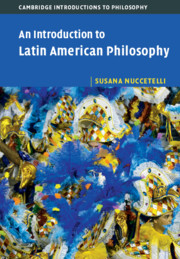Book contents
- An Introduction to Latin American Philosophy
- An Introduction to Latin American Philosophy
- Copyright page
- Dedication
- Contents
- Tables
- Preface
- 1 Setting the Scene: The Iberian Conquest
- 2 Modest and Immodest Feminism
- 3 The Authoritarian Republicanism of Bolívar
- 4 The Liberal Republicanism of Sarmiento and Alberdi
- 5 Homegrown and Imported Positivism
- 6 Martí’s Liberal Anti-Positivism
- 7 Utopian Latin Americanism: Arielism and Mestizofilia
- 8 Soft and Hard Socialism
- 9 Liberation Theology and Philosophy
- 10 Skepticism and Anti-Skepticism About Latin American Philosophy
- Glossary
- Bibliography
- Index of Names and Subjects
- References
3 - The Authoritarian Republicanism of Bolívar
Published online by Cambridge University Press: 15 October 2020
- An Introduction to Latin American Philosophy
- An Introduction to Latin American Philosophy
- Copyright page
- Dedication
- Contents
- Tables
- Preface
- 1 Setting the Scene: The Iberian Conquest
- 2 Modest and Immodest Feminism
- 3 The Authoritarian Republicanism of Bolívar
- 4 The Liberal Republicanism of Sarmiento and Alberdi
- 5 Homegrown and Imported Positivism
- 6 Martí’s Liberal Anti-Positivism
- 7 Utopian Latin Americanism: Arielism and Mestizofilia
- 8 Soft and Hard Socialism
- 9 Liberation Theology and Philosophy
- 10 Skepticism and Anti-Skepticism About Latin American Philosophy
- Glossary
- Bibliography
- Index of Names and Subjects
- References
Summary
Chapter 3 is devoted to Bolivarism, a set of doctrines of applied moral and political philosophy bearing on the Latin America of the early nineteenth century. One doctrine, authoritarian republicanism, has it that the legitimacy of any form of polity is contingent on its capacity to maximize the Enlightenment values of aggregate happiness, safety for all, and political stability of a nation. Another doctrine, the mestizaje model, contends that the collective identity of Latin Americans is not exclusively European, African, or Amerindian but a mixture of these. Bolivarism has continued to fuel ongoing populist phenomena from the nineteenth century onward, as illustrated by the “Bolivarian” revolutions of Hugo Chavez and Nicolás Maduro in Venezuela. It is also a moral force behind some present-day movements that strive to obtain not only political and economic reform elsewhere in Latin America, but also recognition of the distinct racial and ethnic identity of the people of the region. The chapter also explains what is wrong with Marx’s critique of Bolívar while offering insight on what Marx should have said instead.
Keywords
- Type
- Chapter
- Information
- An Introduction to Latin American Philosophy , pp. 54 - 73Publisher: Cambridge University PressPrint publication year: 2020

